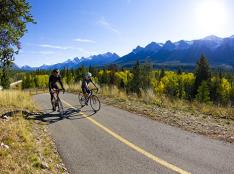Feeling the need to train more as the season goes along is a common trap for cyclists. Once you begin to feel the positive effects of training, it takes discipline to rest. As such, proper rest cannot be over-emphasized, and a schedule is one way to ensure you get it.
A good rest schedule should include periods of rest each day and proper sleep throughout the week. Unless you're a professional bike racer or retired from work, chances are you hold down a full-time job in addition to your training. These are large time commitments and will easily fill your schedule. If you also try to lead a social life or raise a family, you will inevitably begin to sacrifice rest.
If you're going to commit to being a better cyclist, you should schedule your rest just as you schedule everything else. This might sound overly analytical, but giving your body the rest it needs is just as challenging as every other part of training. Schedule it in advance to make sure you get what you need.
More: Are You Getting Enough Sleep?
Take a Nap
Along with your ritual for refueling your body, make sure to include an hour or two for an afternoon nap after each of your long training rides. Once you're off the bike, stretch, refuel, and take a nap. Avoid sleep after 3 p.m., as late afternoon naps will interfere with your sleep at night.
Your muscles may become stiff and not feel great when you wake up, but your heart will benefit from the added rest. To address stiff muscles, take a few minutes to stretch again when you get up.
For a bit of perspective, we hear a lot about how much time a professional cyclist spends on the bike. What you don't hear is how many hours a night he or she spends sleeping. Professional cyclists might spend anywhere from 10 to 12 hours sleeping for each day of racing. Are you getting that much rest?
More: 7 Recovery Strategies Used by Pro Cyclists
The Benefits of Proper Sleep
Not only is quality sleep critical for top athletic performance, it's also the key to a healthy heart and immune system. Frequent lack of sleep can lead to sleep deprivation. What's worse, you can't catch up with one night of good sleep. Rest is cumulative and needs to be taken into consideration each day.
According to the National Institute of Health, adult men and women need an average of 7 to 8 hours of sleep per night. An athlete in training will need more. In a study of healthy adults, most people will sleep 8.5 hours a night under ideal conditions.
If you're getting less than this while holding down a job, raising a family and training, chances are you are in sleep deficit. Under these circumstances, your mental function declines, your body cannot fight infection as effectively and your heart does not recover as it should during sleep. This can result in poor daytime concentration, higher resting heart rates, lower power output on the bike and decreased endurance.
More: 3 Questions for Your Cycling Offseason
If you are unsure about the quality of your sleep, check out the Guide to Healthy Sleep. Included in the guide is brief test and sleep diary to help monitor your rest schedule.
Proper rest and sleep is every bit as critical for athletic success as a proper diet and training plan. Pay more attention to your rest schedule and your ability on the bike will climb to new heights.
More: 9 Post-Ride Recovery Rituals
 Ready to ride? Search for a cycling event.
Ready to ride? Search for a cycling event.
- 2
- of
- 2
About the Author









Discuss This Article